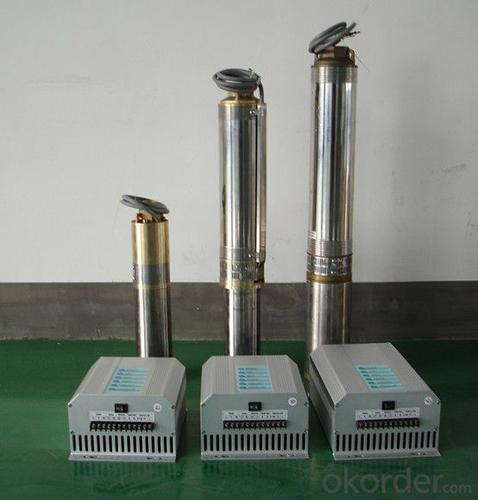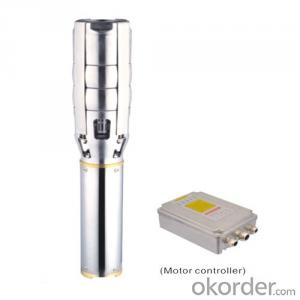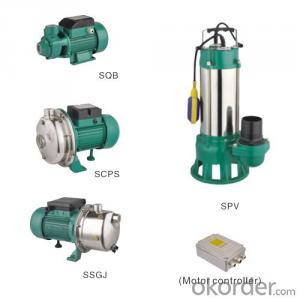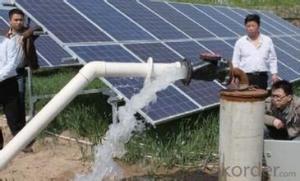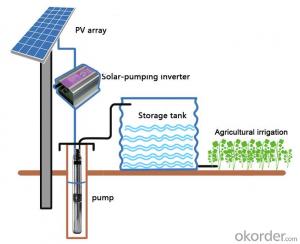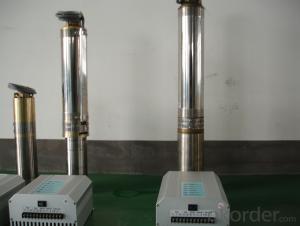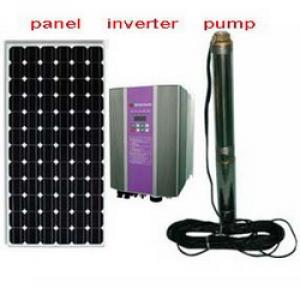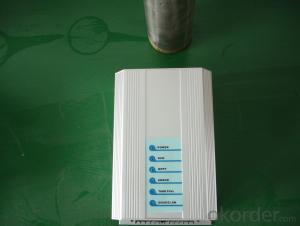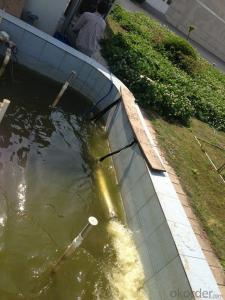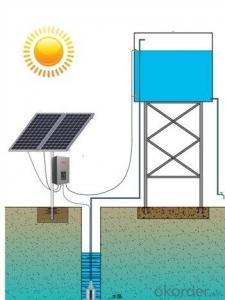12 Volt DC Solar Water Pump
- Loading Port:
- China Main Port
- Payment Terms:
- TT OR LC
- Min Order Qty:
- -
- Supply Capability:
- -
OKorder Service Pledge
OKorder Financial Service
You Might Also Like
Item Description :
This superb new addition to our solar fountain range comes with a 10w solar panel,and a powerful fountain pump that is capable of producing fountains of up to 2m in height. As well as being easy to set up and use.Instruction manual is supplied for assembly and maintenance.
Solar Fountain Key Features :
Powered by direct sunlight
No high voltage electric mains required
Safe for children
Max. height of fountain: 2M
Max. flow capacity: 800 L/H(176 GAL)
10W Polycrystalline solar panel included
18V DC brushless pump
Solar Pump Features :
Can produce fountains up to : 2M (tube height) 1.4M (fountain height)
Comes with multiple nozzle accessories
Cable Length : 5M
Solar Panel Features :
10W peak power.
Polycrystalline highly efficient solar panel
Comes mounted in aluminium frame
Comes with ground stake and rotating knob so you can angle your panel toward the sun
What You Will Get :
10W solar panel
Solar pump
Ground Sake
Nozzle accessories
Precautions :
DO NOT alter or change the product itself or its components
Operate pump in freshwater only, never above 50 degrees celsius
Keep away from flammable liquids
Do not connect to any other power supply other than the included
- Q: Can a solar pump be used for irrigation in vineyards?
- Certainly! Irrigation in vineyards can indeed make use of solar pumps. These pumps offer a sustainable and economical option for supplying water to vineyards. Instead of relying on conventional power sources, solar pumps utilize solar energy to operate. This makes them ideal for vineyards situated in remote locations or areas with limited access to electricity grids. By ensuring a steady and dependable water supply for irrigation, solar pumps contribute to the overall well-being and productivity of vineyards. Moreover, they require minimal maintenance and can be conveniently installed, making them a pragmatic choice for vineyard owners who wish to minimize their environmental footprint and reduce operational expenses.
- Q: Are there any limitations to the type of water source that can be used with a solar pump?
- Yes, there are certain limitations to the type of water source that can be used with a solar pump. One of the main limitations is the availability of sunlight. As solar pumps rely on solar energy to operate, they are most effective in areas with ample sunlight. If the water source is located in a heavily shaded area or experiences long periods of cloudy weather, the efficiency and effectiveness of the solar pump may be compromised. Another limitation is the depth of the water source. Solar pumps are typically not suitable for extracting water from deep wells or boreholes. They are more commonly used for shallow water sources such as ponds, rivers, or shallow wells. The depth limitation is due to the fact that solar pumps have limited power output compared to conventional electric pumps, which makes them less capable of lifting water from greater depths. The quality of the water source is also a consideration. Solar pumps can handle clean or slightly dirty water, but they may struggle with highly contaminated or saline water. This is because certain impurities or chemicals in the water may damage or clog the pump components, reducing its efficiency and lifespan. In such cases, additional filtration or pre-treatment systems may be required to ensure the longevity and optimal performance of the solar pump. Lastly, the flow rate and pressure requirements of the water source should also be taken into account. Solar pumps have certain limitations when it comes to providing high flow rates or high-pressure outputs. If the water source requires a significant amount of water or a high-pressure output, a solar pump may not be the most suitable option. Overall, while solar pumps offer many advantages, it is important to consider the specific characteristics and limitations of the water source before choosing to use a solar pump.
- Q: Can a solar pump be used for water supply in dairy farms?
- Yes, a solar pump can be used for water supply in dairy farms. Solar pumps are an environmentally friendly and sustainable option for pumping water, and they can effectively fulfill the water requirements of dairy farms. The use of solar energy not only reduces dependency on traditional energy sources but also helps in cost savings for the farm. Additionally, solar pumps are reliable, low-maintenance, and can provide a consistent water supply for the dairy farm's needs.
- Q: How does the performance of a solar pump vary with different solar panel orientations?
- The performance of a solar pump can vary with different solar panel orientations due to several factors. Firstly, the orientation of the solar panels determines the amount of sunlight they receive throughout the day. Solar panels are most efficient when they are directly facing the sun, allowing them to capture the maximum amount of solar energy. Therefore, panels that are perfectly aligned with the sun's path will generate the highest amount of electricity, resulting in optimal performance for the solar pump. Secondly, the tilt angle of the solar panels also plays a crucial role in their performance. The tilt angle determines how well the panels can capture the sunlight at different times of the day and throughout the year. A tilt angle that matches the latitude of the installation location is generally considered optimal, as it allows for maximum exposure to the sun's rays. Furthermore, the direction in which the solar panels are facing can impact their performance. In the northern hemisphere, solar panels facing south tend to generate the highest amount of electricity, while in the southern hemisphere, panels facing north are typically more efficient. This is because the panels are oriented towards the sun's path and can capture sunlight for longer periods during the day. It is important to note that the performance of a solar pump is directly dependent on the electricity generated by the solar panels. Any variation in solar panel orientation can affect the amount of energy produced, which in turn affects the operational efficiency of the pump. Therefore, choosing the optimal solar panel orientation is crucial for maximizing the performance of a solar pump and ensuring its reliable operation.
- Q: How do solar pumps handle water with high turbidity or particulate matter?
- Solar pumps can handle water with high turbidity or particulate matter by using a combination of filtration and robust design features. These pumps are equipped with built-in filters that help remove large particles and sediment from the water before it enters the system. Additionally, some solar pumps are designed with self-cleaning mechanisms that prevent clogging and maintain high performance even in the presence of turbidity or particulate matter. This ensures that the pumps can effectively handle water with high levels of impurities without compromising their functionality.
- Q: Can a solar pump be used for water supply in schools and hospitals?
- Yes, a solar pump can be used for water supply in schools and hospitals. Solar pumps are efficient and eco-friendly alternatives to traditional pumps as they rely on solar energy to operate. They can provide a reliable and sustainable water supply, making them suitable for use in educational institutions and healthcare facilities.
- Q: Can a solar pump be used for water circulation in fountains or decorative features?
- Yes, a solar pump can be used for water circulation in fountains or decorative features. Solar pumps are specifically designed to operate using solar energy, making them a sustainable and eco-friendly option for powering water features. They can effectively circulate water, creating beautiful and mesmerizing displays in fountains or decorative features without the need for electricity or traditional pumps.
- Q: How does the efficiency of a solar pump compare to a traditional pump?
- The efficiency of a solar pump is generally higher compared to a traditional pump. Solar pumps utilize energy from the sun, which is a renewable resource, to operate. This means that they do not rely on fossil fuels or electricity from the grid, resulting in reduced energy consumption and lower operating costs. Solar pumps are designed with advanced technology and are specifically engineered to optimize energy conversion. They use photovoltaic cells to convert sunlight into electricity, which powers the pump. This direct conversion eliminates the need for mechanical or electrical energy transmission, reducing energy losses and increasing overall efficiency. Traditional pumps, on the other hand, typically rely on electricity from the grid or fossil fuel-powered engines. These pumps may be less efficient due to energy losses during generation, transmission, and conversion processes. Additionally, traditional pumps often require more maintenance and have higher operational costs, as they are dependent on external energy sources. Furthermore, solar pumps are often more environmentally friendly compared to traditional pumps. They do not emit greenhouse gases or pollutants during operation, contributing to a cleaner and more sustainable energy solution. While the efficiency of solar pumps can vary depending on factors such as design, size, and application, they generally offer higher efficiency and lower operating costs compared to traditional pumps.
- Q: Can a solar pump be used for water supply in off-grid zoos?
- Absolutely! Water supply in off-grid zoos can definitely benefit from the use of solar pumps. These pumps are incredibly adaptable and can operate in remote areas where electricity is unavailable. By harnessing solar energy, the pumps are able to draw water from various sources, including wells, rivers, and ponds. This versatility makes solar pumps the perfect solution for off-grid zoos seeking a dependable and sustainable water supply for their animals. Moreover, solar pumps are highly efficient and require minimal maintenance, making them a cost-effective choice for long-term use in off-grid locations. Additionally, the utilization of solar pumps contributes to the reduction of the zoo's environmental impact by tapping into clean and renewable energy sources.
- Q: Can a solar pump be used for water supply in off-grid hospitals?
- Water supply in off-grid hospitals can be achieved using a solar pump. These pumps are an ideal solution for remote locations where access to electricity is limited or unreliable. By harnessing energy from the sun and converting it into electrical power, solar pumps are able to operate effectively. The use of solar pumps in off-grid hospitals offers numerous benefits. They provide a sustainable and cost-effective water supply solution, eliminating the need for diesel generators or grid connection. This not only reduces operational costs but also minimizes the environmental impact. Moreover, solar pumps require minimal maintenance and have a long lifespan, ensuring their reliability and durability in off-grid hospital settings. Additionally, solar pumps can meet the specific water requirements of hospitals, including drinking water, sanitation, and medical equipment sterilization. They can be easily integrated with storage tanks or water treatment systems, guaranteeing a continuous and dependable water supply. To sum up, solar pumps are a practical and efficient choice for off-grid hospitals, delivering a sustainable and reliable solution that caters to the unique needs of healthcare facilities, even in remote areas.
Send your message to us
12 Volt DC Solar Water Pump
- Loading Port:
- China Main Port
- Payment Terms:
- TT OR LC
- Min Order Qty:
- -
- Supply Capability:
- -
OKorder Service Pledge
OKorder Financial Service
Similar products
Hot products
Hot Searches
Related keywords

